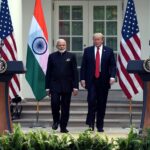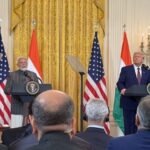India’s Foreign Secretary Vikram Misri has confirmed that Prime Minister Narendra Modi and President Donald Trump have announced plans to negotiate the first phase of a multi-sector Bilateral Trade Agreement (BTA), aiming for completion by fall 2025.
“This issue was discussed today. There is an understanding that we will try and do it as quickly as possible… So, we are looking at the next seven to eight months to get this done,” Misri told South Asian Herald during a special press briefing about PM Modi’s visit on February 13, 2025, at the Willard Intercontinental in Washington, D.C.
At the press briefing, Misri was joined by Indian Ambassador to the United States, Vinay Kwatra, India’s Foreign Ministry Spokesperson, Randhir Jaiswal, and Joint Secretary (Americas), Nagaraj Naidu.
Misri, noted that both teams have received directives from the highest levels to commence engagement immediately.
“Recognizing that this level of ambition would require new, fair-trade terms, the leaders announced plans to negotiate the first tranche of a mutually beneficial, multi-sector Bilateral Trade Agreement (BTA) by fall of 2025,” noted the India-US joint statement issued during PM Modi’s visit. “The leaders committed to designate senior representatives to advance these negotiations and to ensure that the trade relationship fully reflects the aspirations of the COMPACT.”
Calling the joint statement a “rich and substantive statement,” Misri said it outlines the near- and medium-term roadmap for India-U.S. relations.
He emphasized that both countries will adopt an integrated approach to strengthening bilateral trade across goods and services, addressing areas such as increasing market access, reducing tariff and non-tariff barriers, and deepening supply chain integration.
Regarding ongoing trade and tariff frictions, and whether initiatives such as I2U2, IMEC, and Quad could unify the Trump and Modi administrations, Misri affirmed, “Yes,” explaining that while these forums are not trade agreements, they facilitate understanding and can enhance cooperation.
Misri, who was part of PM Modi’s delegation from India, highlighted that Modi’s visit to the U.S. was “very substantive and productive.”
“This is the Prime Minister’s first visit to the United States after the inauguration of President Trump for a second term,” he said, adding that the timing, just three weeks after the inauguration, signals the priority both leaders place on the India-U.S. relationship.
According to him, discussions at the White House covered a broad spectrum of topics, including strategic and security cooperation, defense, trade and economic engagement, technology, energy security, people-to-people linkages, and regional and global concerns.
“The two leaders jointly launched the US-India compact for the 21st century. This compact stands for catalyzing opportunities in military partnership, accelerated commerce and technology. In the area of trade and investment, for instance, the leaders launched mission 500 aiming to more than double total two-way trade to $500 billion by 2030,” he added.
He noted a renewed commitment to greenfield investments in high-value industries, with the joint statement highlighting over $7 billion in investments by Indian companies such as Novelis, Jindal Steelworks, Jubilant, and Epsilon.
Both leaders also announced plans to finalize a new 10-year framework for the U.S.-India Major Defense Partnership, spanning 2025 to 2035, with completion expected later this year, he added.
On Artificial Intelligence, he conveyed that the leaders committed to bringing Indian and U.S. private industries together to develop an AI roadmap by year’s end. This initiative will enable industry partnerships and investments in next-generation data centers and AI computing infrastructure.
Misri also announced a new partnership between the U.S. National Science Foundation (NSF) and India’s newly established Anusandhan National Research Foundation (ANRF) to deepen research linkages in critical and emerging technologies. A memorandum of understanding (MoU) was recently signed between the NSF and ANRF to advance this collaboration.
Additionally, the leaders agreed to strengthen higher education partnerships and invited U.S. institutions to establish offshore campuses in India. They committed to streamlining avenues for legal mobility of students and professionals while addressing illegal immigration and human trafficking.
On deepening strategic convergence, Misri said that India will host the Quad Summit later this year, with PM Modi extending an invitation to President Trump. The leaders also agreed to convene partners under the IMEC and I2U2 initiatives within the next six months to announce new collaborations.






